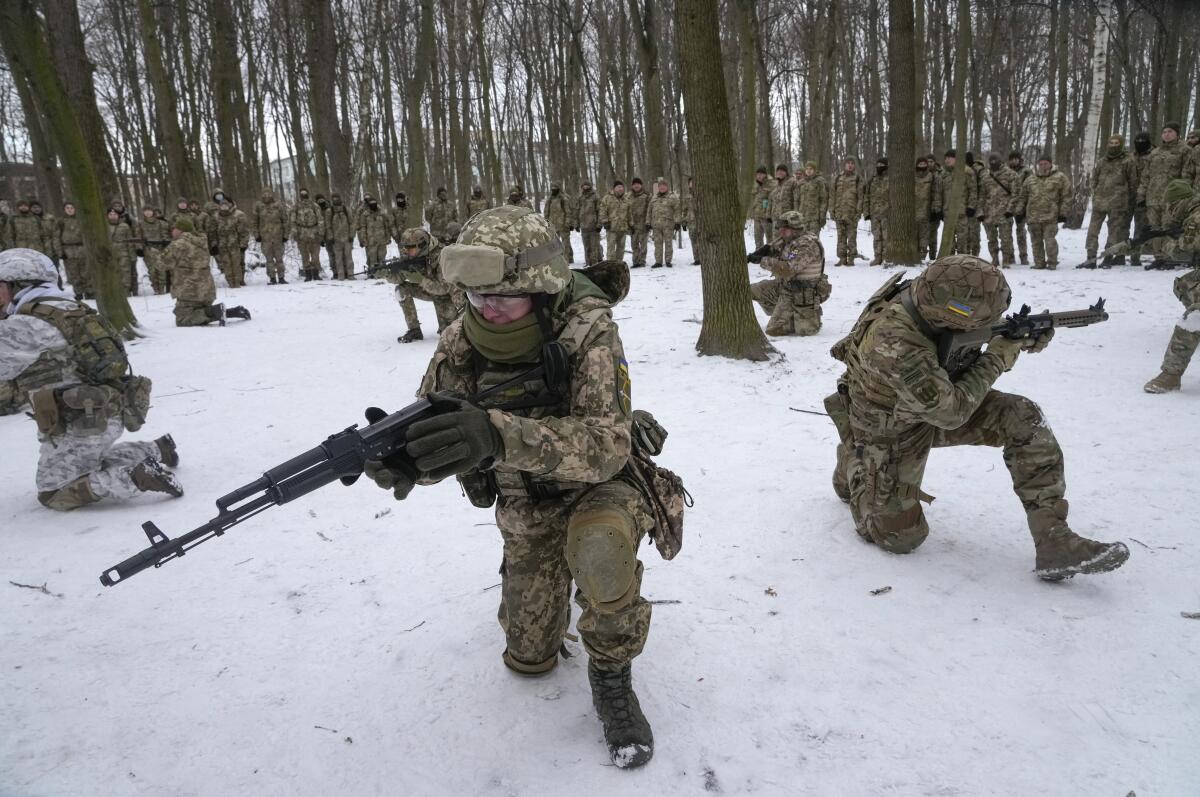Op-Ed: Ukraine’s fate could renew a race for weapons of mass destruction

- Share via
Regret is what Ukrainian leaders must be feeling these days, as Russia amasses troops along the border. There’s nothing that says “keep your hands off my territory” like fully armed, nuclear-tipped weaponry — the sort that Kyiv surrendered shortly after the Soviet Union collapsed in 1991. Now officials have no nuclear option to deter an invasion.
The international community should be careful how it lets this play out. Nations that still have access to weapons of mass destruction will draw conclusions about whether to cling to those armaments at all costs.
It’s hard to dispute that nuclear weapons have proven to be the ultimate deterrent. They have prevented nuclear powers from consciously going to war against each other for 76 years. No nuclear weapons have been fired in hostility on other nations since the Americans bombed Hiroshima and Nagasaki at the end of World War II, in August 1945.
Nuclear weapons were once held by Ukraine, though Russia maintained full operational control of them. Kyiv gave up the nukes in a disarmament deal with Russia in the 1994 Budapest agreement, in exchange for security assurances. This essentially surrendered nuclear weapons on Ukrainian territory.
That deal lasted until the end of the 2014 Winter Olympic Games. Russian President Vladimir Putin then invaded Ukraine, annexing Crimea and taking other areas of eastern Ukraine, despite international law and United Nations resolutions.
Belarus and Kazakhstan, like Ukraine, also gave up their nuclear arsenals, partly as a response to American desires and incentives. Minsk and Nur-Sultan got to keep their authoritarian leaders, but they surrendered their nukes to Russia for safe dismantling underwritten by the United States. Today, all three nations are either partially occupied by Moscow-backed troops or harbor Russian security forces and advisors.
Ukraine, Belarus and Kazakhstan gave up their weapons of mass destruction for what now appear to be empty promises. Belarus and Kazakhstan have leaders from the Soviet era who agree to play ball with Putin. Only Ukraine has resisted with any conviction.
If there is going to be an end to nuclear proliferation, Ukraine needs to be a success story, not a lost cause. The U.S. and Britain are now plying Ukraine with defensive weapons to give it a fighting chance at survival. Germany and others need to see this as a wake-up call. Any win for Putin in Ukraine could lead to a renewed global pursuit of nuclear weapons. Indisputable support for Ukraine could minimize that appetite.
They have an opportunity now to demonstrate that Ukraine’s resistance to Russia can be backed by international norms and allies instead.
Ukraine’s peril now may well send a message to other governments that giving up nuclear weapons will reduce their national security.
What does its example show the world? Iran and North Korea are likely to deduce from Kyiv’s unilateral disarmament and current predicament that they should go full bore on their military nuclear warhead and missile programs.
The rest of the world would largely agree those pursuits need to be slowed down, if not outright stopped. In the face of Russian aggression against Ukraine, the international community’s actions, or inaction, will affect future decisions in Tehran and Pyongyang. The U.S., NATO and others must do what it takes to prove a nation like Ukraine can remain sovereign even though it gave up weapons of mass destruction.
Markos Kounalakis is a visiting fellow at the Hoover Institution. He is the author of “Freedom Isn’t Free: The Price of World Order” (Anthem Press, February 2022).
More to Read
A cure for the common opinion
Get thought-provoking perspectives with our weekly newsletter.
You may occasionally receive promotional content from the Los Angeles Times.










